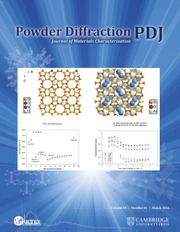No CrossRef data available.
Article contents
X-ray powder diffraction data of a new compound As2MoO7
Published online by Cambridge University Press: 10 January 2013
Abstract
Arsenic molybdate, As2MoO7, produced by phase transformation of As4Mo3O15, has been analyzed by X-ray powder diffraction. The powder diffraction data were collected with a focusing (Guinier-type) transmission diffractometer equipped with a primary-beam monochromator (Ge 111) for Cu Kα radiation and a scanning position-sensitive detection system. A monoclinic unit cell was determined using an indexing program and compared with calculated single crystal data.
Information
- Type
- New Diffraction Data
- Information
- Copyright
- Copyright © Cambridge University Press 2000
References
Hums, E., and Göbel, E. H. (1990). “X-Ray Powder Diffraction Data of a New Compound As 4Mo 3O 15,”Powder Diffr. 3, 170–172.CrossRefGoogle Scholar
Hums, E., Rothammel, W., and Burzlaff, H. (1993). “Structure of MoAs 2O 7: Corrigendum and Addendum,” Acta Crystallogr., Sect. C: Cryst. Struct. Commun. C49, 641–642.CrossRefGoogle Scholar
ICDD (1997). As 2MoO 7 (JCPDS No. 81-1148).Google Scholar
Visser, J. W. (1969). “A Fully Automatic Program for Finding the Unit Cell from Powder Data,” J. Appl. Crystallogr. 2, 89–95.CrossRefGoogle Scholar

